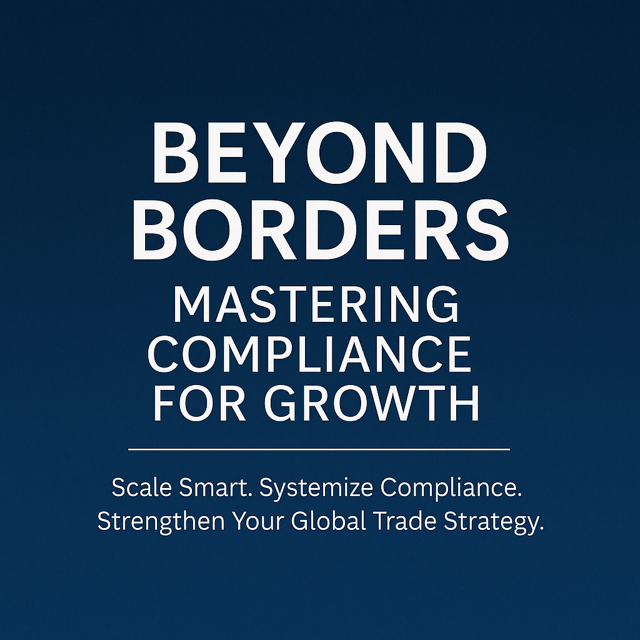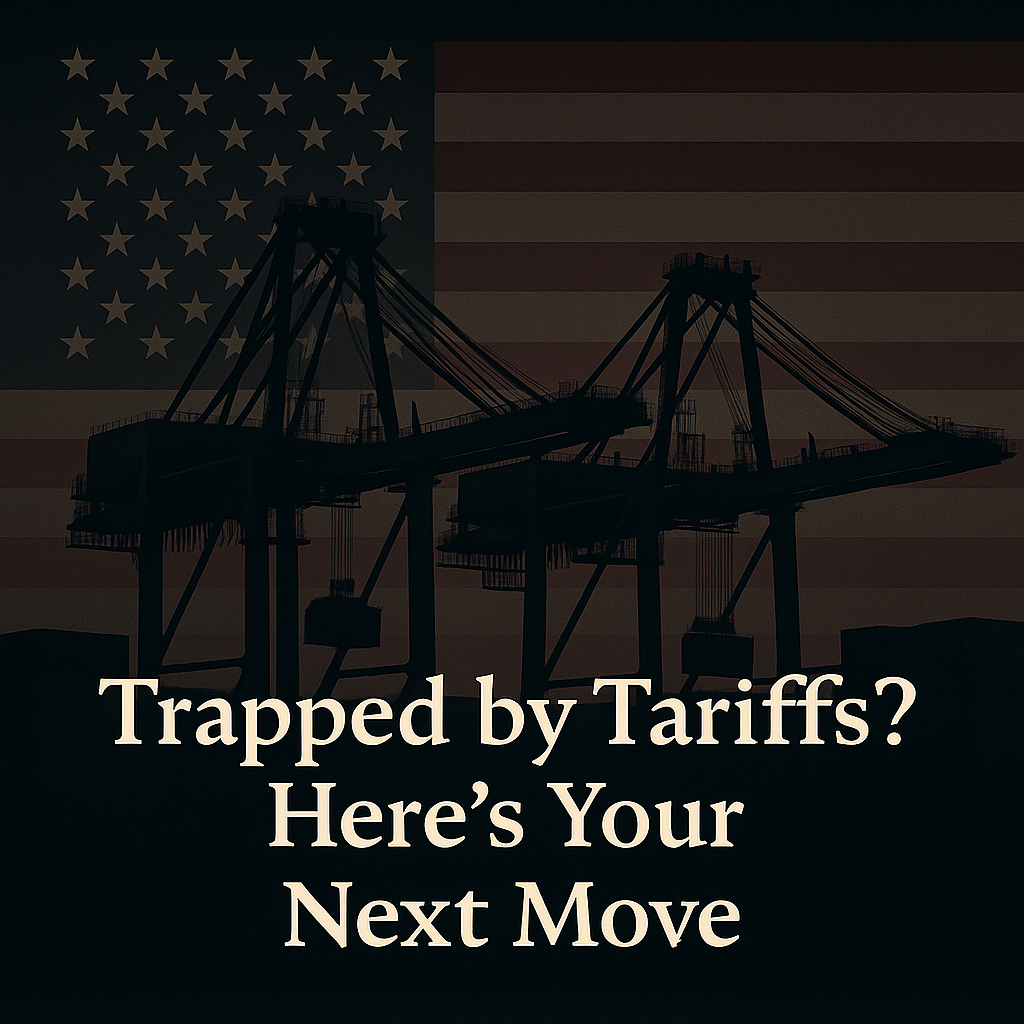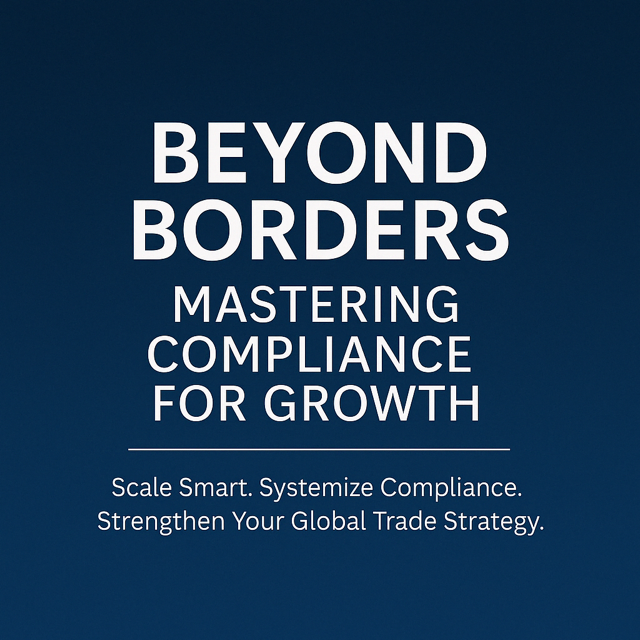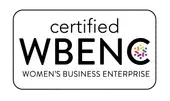
Audio Conversation:
Full Blog Article:
In today’s global marketplace, your supply chain is no longer just a business operation; it’s a reputation, a risk factor, and a growth lever all in one. As environmental, social, and governance (ESG) priorities move into the boardroom and consumer expectations grow louder, small and midsize businesses (SMBs) can’t afford to ignore where and how their products are made. The era of traceability is here, and it’s redefining how companies build their trade strategies.
For U.S. importers and exporters, ESG and supply chain transparency are no longer optional. They’re business-critical, and they’re reshaping trade compliance from a checklist to a competitive edge.
Why ESG and Traceability Matter in Global Trade
Let’s break it down. ESG refers to a set of standards for a company’s behavior used by socially conscious investors and consumers to screen potential investments or purchases. Here’s how they show up in trade:
- Environmental: Are you sourcing from suppliers who pollute local ecosystems? What’s your carbon footprint from global shipping?
- Social: Are labor rights being respected in your overseas factories?
- Governance: Do you have policies in place to prevent corruption, fraud, and unethical sourcing?
Traceability, on the other hand, is the ability to track a product from raw material to end-user. It’s the infrastructure that proves your ESG claims and the shield that protects your business when scrutiny arises.
What’s driving this shift?
- Regulatory Pressure: Governments are cracking down. From the Uyghur Forced Labor Prevention Act (UFLPA)¹, to the German Supply Chain Due Diligence Act², importers are now required to prove their goods aren’t linked to human rights violations.
- Consumer Demand: Today’s buyers want ethical brands. Transparency builds trust and loyalty.
- Investor Expectations: Sustainable supply chains are now viewed as lower risk, more resilient, and more attractive to institutional investors.
Real-World Example: ESG in Action
Let’s say you’re a U.S. company importing apparel from Southeast Asia. If your supplier sources cotton from a region under sanctions or known for forced labor practices, your shipment could be detained under UFLPA. Without clear documentation showing your product’s origin, your goods and reputation are at risk.
Now flip the script. You’ve worked with a logistics manager or freight partner along with a customs expert to map out your supply chain. You’ve documented every step from the cotton field to the warehouse. You can confidently show that your supply chain is ethical, secure, and fully compliant. Not only do you clear customs faster, but you’ve also built a brand that consumers trust.
That’s the power of proactive ESG and traceability.
From Compliance to Competitive Advantage
When small businesses hear “ESG,” many worry it’s too big, too costly, or only for large corporations. But that’s a misconception. Here’s how embracing ESG and traceability can benefit SMBs:
- Build Brand Trust: Customers want to know where their products come from. Transparent sourcing and ethical practices can become part of your brand story.
- Streamline Compliance: Regulatory documentation, once seen as a burden, can now be built into digital systems that track sourcing, production, and shipping.
- Strengthen Supplier Relationships: When you prioritize ethical standards, you naturally gravitate toward more reliable and resilient suppliers.
- Expand Global Access: Many international buyers, especially in Europe, now require ESG standards from all suppliers, regardless of size.
- Mitigate Supply Chain Disruptions: Traceability helps identify risks early, whether it’s a factory shutdown, raw material shortage, or geopolitical issue, allowing quicker adjustments.
How U.S. Customs and Freight Partners Can Help
You don’t have to tackle traceability and ESG alone. The right customs broker and freight partner can be your best strategic ally.
Here’s how they help:
- Supply Chain Mapping: Customs Brokers can help you trace each tier of your supply chain and document critical data points like country of origin, HS code accuracy, and supplier certifications.
- Compliance Consulting: From forced labor laws to climate disclosure requirements, brokers help you navigate the maze of regulations.
- Documentation and Digital Tools: Modern brokers use digital platforms that simplify data collection and traceability, making audits and inspections smoother.
- Risk Flags and Due Diligence: A trained customs expert can alert you if a region or product is under sanctions or elevated scrutiny.
If your business doesn’t have the internal capacity to track all this, outsourcing to a compliance partner ensures you stay protected, without stalling your growth.
Bringing It All Together:
Your 3-Step Starter Plan
Step 1: Know Your Supply Chain
Use supplier questionnaires, shipping records, and third-party certifications to document who’s involved in making and moving your product.
Step 2:
Establish Internal SOPs for ESG & Traceability
Create a standard operating procedure (SOP) for how you collect, review, and update supplier data. This doesn’t have to be complex, it just has to be consistent.
Step 3: Partner with a Trade Professional
Connect with a U.S. customs broker or freight forwarder who understands your industry and can integrate traceability into your compliance program.
The Road Ahead:
ESG as a Growth Strategy
Global trade is evolving. What used to be hidden behind containers and shipping labels is now coming into full view. Consumers want transparency. Regulators demand accountability, and businesses that respond proactively will be the ones that thrive. For U.S. SMBs, this is an opportunity, not just a requirement.
Building traceability and ESG into your trade strategy today can open doors tomorrow - new markets, new customers, and new investor confidence.
Summary:
Key Takeaways
- ESG (Environmental, Social, Governance) and traceability are no longer optional; they’re becoming standard expectations in global trade.
- New regulations like the UFLPA require importers to prove ethical sourcing.
- Transparent supply chains build trust, reduce risk, and improve compliance outcomes.
- SMBs can start by mapping their supply chain, creating internal SOPs, and working with a trusted broker or freight forwarder.
- A strong trade strategy that includes ESG and traceability is not just about avoiding penalties; it’s about growing with integrity.
Frequently Asked Questions (FAQs)
Q1: What is traceability in global trade, and why does it matter to small businesses?
A1:
Traceability is the ability to follow a product’s journey from origin to final delivery. For small businesses, it matters because regulations (like UFLPA) now require proof that products weren’t sourced from unethical or sanctioned regions. It also helps build trust with customers and avoids costly customs delays.
Q2: Can small businesses afford to implement ESG practices and supply chain transparency?
A2:
Yes. While ESG may sound intimidating, small businesses can start with basic steps like knowing their suppliers, asking for certifications, and creating internal documentation. Many customs brokers and freight partners offer services to help build this infrastructure affordably.
Q3: What are the risks of ignoring ESG and traceability in trade?
Q4: The risks include shipment detentions, fines, reputational damage, and even import bans. In a competitive market, failing to prioritize ESG can also result in lost customers and being excluded from global partnerships.
If you're curious to see how we can help, please visit our website http://magneticprecision.com/. For inquiries and questions, contact us at inquiries@magneticprecision.com
References:
- Uyghur Forced Labor Prevention Act (UFLPA): Link
- German Supply Chain Due Diligence Act (LkSG): Link
- U.S. Customs and Border Protection – Trade Newsroom: Link
- World Economic Forum – Why Traceability Matters: Link
- OECD Due Diligence Guidance: Link
🎧🎙️Want to hear more?
Stay informed and inspired through two powerful channels:
- Borders & Bourbon - A Global Trade Podcast – Pour yourself a glass and join us for real talk on international trade. This show delivers solution-driven insights tailored for small businesses navigating the complexities of global markets. Available on all major streaming platforms.
- Global Trade Navigator - Prefer to read or listen to quick, practical tips? Explore more blog series articles like these or tune into the companion podcast on Spotify, where we break down each article to help you chart a smarter course through import/export compliance.
No matter your style, sip and listen, or scroll and learn, we’ve got your global trade journey covered.
Stay tuned for more insights as we continue our journey to mastering global trade compliance!




